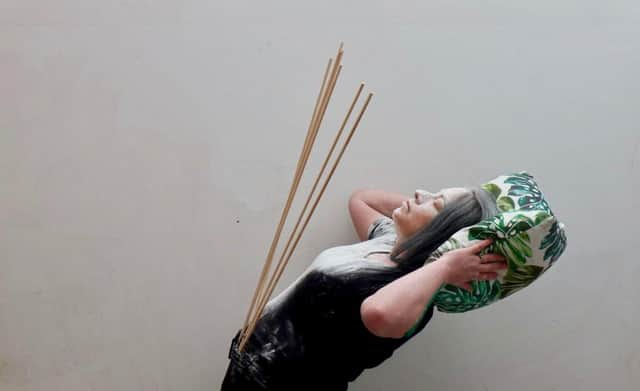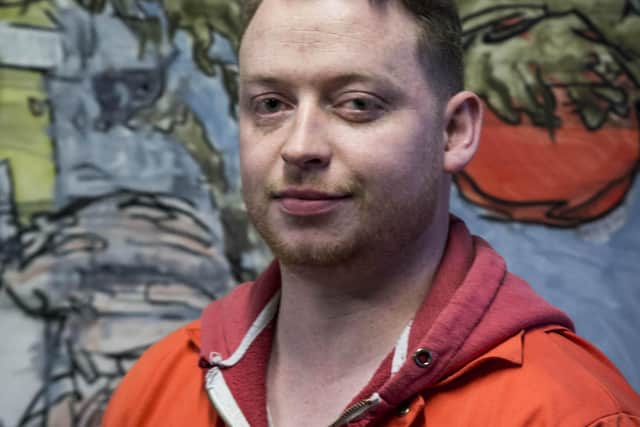Championing art of deaf, disabled and neurodiverse artists in Northern Ireland


The arts are not just one of the most powerful arenas for the exploration of the beauty and tragedy of human experience, but also a place for personal catharsis and expression that can enhance the mental health and wellbeing of those engaged in creative enterprise.
But diversity in the arts remains a challenge, particularly for those who identify as deaf, disabled or neurodiverse. According to UK-wide research by the Arts Council England (ACE), disability-led organisations now make up over 1% of the portfolio of arts institutions. Further, while 20% of the UK population as a whole identify as disabled, the figure for those working in the arts in England is just 4%, in Wales 3% and in Scotland and Northern Ireland, an appallingly low 2%.
Advertisement
Hide AdAdvertisement
Hide AdOne organisation doing its best to improve the fortunes of disabled artists is the University of the Atypical, based in Belfast, which was founded by the late Chris Ledger, known as a true pioneer for those with disabilities seeking to find their place in the always precarious and under-funded art world.


The organisation has just launched an award scheme in their former CEO’s memory which deaf, disabled or neurodiverse artists working across a variety of art forms are eligible to apply for. The University of the Atypical now has a total of four awards (The Chris Ledger Legacy Awards) of £5,000 each to support the work of its chosen candidates, which are funded by Unlimited and the Paul Hamlyn Foundation, and again are open to applicants identifying as disabled working across all conceivable art forms.
Ledger was something of a legend on the Northern Ireland arts scene in her promotion of disabled artists, and worked tirelessly to help them secure funding and remove barriers that prevented them from gaining access and acceptance within the local arts scene.
New CEO, Damien Coyle, who remembers a “determined, vivacious, energetic woman who was always wearing red lipstick even when arthritis left her using a walking stick or confined to a wheelchair” before her untimely death due to cancer a year ago, said: “Chris’s loss is felt across the sector as she was a real force in the arts and cultural sector here and she was a true friend and inspiration to many people. The awards are a fitting tribute to her achievements and are welcomed by all those she supported. This support underpins the developmental role University of Atypical plays in promoting the work created by deaf, disabled and neurodiverse artists and in facilitating career enhancement opportunities.”
Advertisement
Hide AdAdvertisement
Hide AdIn 2009 Ledger, originally from Lancashire, but who had lived in Northern Ireland for decades, joined the Arts and Disability Forum as chief executive and under her leadership it evolved to become the University of Atypical in 2019, pioneering outstanding work by disabled artists which clearly displayed that disability need be no obstacle to quality artistic practice. In tandem with finding financial support for such artists she also set up the annual Bounce Disability and Deaf Arts Festival which drew performers from across Europe to the city and did much to shine a light on the excellence and inventiveness of those who are differently abled across a range of art forms.
Performance artist Sinead O’Donnell, 45, who is originally from Dublin but has been based in Belfast since she was 19, suffers from dyslexia and communication problems as well as mental health issues and is also in a lot of pain in different parts of her ‘impaired body’. She was mentored by Chris in the early days of her career and is immensely grateful for the funding she secured in helping her pursue her practice, which is novel, unique and provocative. For example at the moment she is working on a show called ‘Violent’ which can be viewed online whereby she will stand holding 220 white dinner plates for as long as she can and as the pressure builds they will crash to the ground - what she hopes will be a kind of statement and a living, fragmented sculpture about the domestic strife many women have suffered under lockdown restrictions. Another forthcoming piece, ‘Backwards’, will see her walk backwards through Londonderry, challenging the way our perspectives are altered if we move through the same space in a different way.
“I wouldn’t be where I am today without the University of the Atypical or without Chris, who understood that often for disabled artists confidence and funding are real barriers to artistic success. I studied textile, sculpture, all different forms of art, but I felt that using my body was a much more direct way of communicating my ideas by making actions in front of audiences. This took me to all different parts of the world performing. Sometimes I perform in a space with an established audience and sometimes I perform on the street where I encounter an incidental audience. My impaired body is my canvas.”
Sinead will also produce new work for the Bounce Festival in October exploring places that other women artists consider as safe spaces.
Advertisement
Hide AdAdvertisement
Hide Ad“I wouldn’t be were I am without the University of the Atypical and meeting impaired artists and being inspired by them. I became part of a community that allowed me to give me time and money to develop my work.”
O’Donnell also received funding to develop work for the 2012 Paralympics Games, which did much to popularise the work of disabled artists across the UK who continue to be marginalised and under represented.
“I would not have been able to be where I am unless Chris had believed in and empowered me.”
Expressionist painter Brian Kielt, 34, from Maghera, suffers from depression and anxiety and is another beneficiary of the University of the Atypical’s support.
Advertisement
Hide AdAdvertisement
Hide Ad“I’m inspired by Sickert and Luc Tuymans in my practice. I met Chris while running a studio in Belfast. She encouraged me to apply for a grant for disabled artists and initially I was reluctant because I was unsure if I was deserving enough but she believed I had a gift and understood how I struggled and she was also an advocate of artists with disabilities that are not visible. It is so therapeutic to vent things that are going on in your head on canvas. I like to look at how people perceive memory and how that can be so subjective. I work from found images in magazines and family photographs to establish a new narrative that the viewer can discover for themselves. I work in oil and charcoal on canvas and I suppose my work does tend to be macabre.
“I received a grant from the University of Atypical in 2018 and before lockdown had an exhibition on its premises, entitled ‘Confessional’. This looked at imagery that all seemed to look at that blurring of the lines between victim and perpetrator depending on your perspective. Painting is my escape, it’s what I look forward to doing. I can let loose and vent frustrations and put my voice out there onto canvas. Chris helped me to reach that outlet..”
Current CEO Damien Coyle was appointed in November 2020, succeeding Ledger, a former colleague and friend.
Since the start of lockdown it has disseminated £150K in funding to artists to keep them afloat during the constraints of Covid.
Advertisement
Hide AdAdvertisement
Hide Ad“We don’t see the fact that our artists are disabled as producing any diminution in the quality of their work. And there has been an historical difficulty in terms of the marginalisation of disabled artists, which Chris worked hard to remove here in Northern Ireland. We want the Chris Ledger Legacy Awards to assist all kinds of creative practitioners affected by disability.”
The Chris Ledger Legacy Awards are now open for application until October 12. Award recipients will be notified by October 25. Visit www.universityofatypical.org.
Comment Guidelines
National World encourages reader discussion on our stories. User feedback, insights and back-and-forth exchanges add a rich layer of context to reporting. Please review our Community Guidelines before commenting.